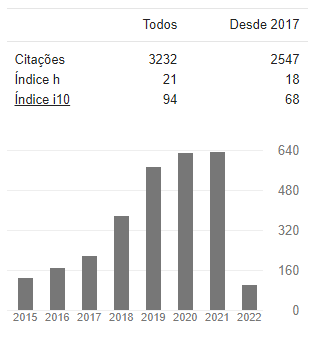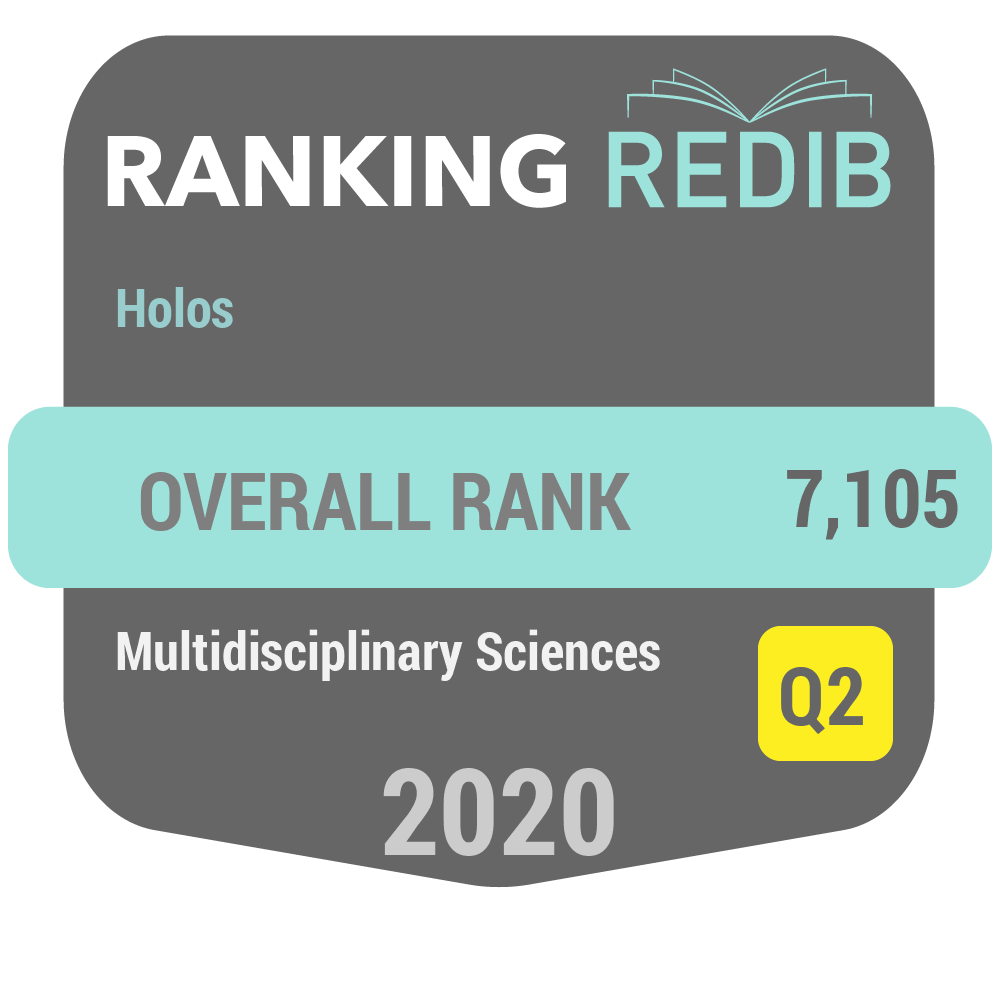PROGRAMAÇÃO DA PRODUÇÃO EM FLOW SHOP PERMUTACIONAL ENVOLVENDO MEDIDAS DE ATRASO: UMA CONTRIBUIÇÃO BIBLIOMÉTRICA A PARTIR DA BASE DE DADOS WEB OF SCIENCE
DOI:
https://doi.org/10.15628/holos.2017.5711Palavras-chave:
Programação da produção, Sequenciamento da Produção, Análise de redes, Análise bibliométricaResumo
A organização de dados sobre a produção científica de um período contribui para a continuidade da pesquisa e para o desenvolvimento de um campo particular do conhecimento. O principal objetivo desta pesquisa é conhecer o panorama da produção científica sobre programação da produção em sistemas flow fhop permutacional envolvendo medidas de atraso, de maneira quantitativa, identificando os periódicos de destaque, autores que mais abordaram o tema e os trabalhos mais representativos. Tratou-se de um estudo de análise bibliométrica, através da base de dados Web of Science e seu tratamento pelos softwares ResearcherID® e VosViewer®. Para a pesquisa, utilizou-se os seguintes expressões-chave: "permu * flow * e tard *" ou "permu * flow* e atras*", gerando uma amostra constituída por 133 artigos. Ao final do estudo, apresentou-se resultados de estatística descritiva com várias identificações, como os principais autores e os artigos e periódicos mais referenciados por estudiosos em todo o mundo. Além das principais redes sociais: de citações e cocitações. Tem-se neste trabalho, portanto, um importante aliado no desenvolvimento de novas abordagens sobre o tema.
Downloads
Referências
Alves, A. D., Yanasse, H. H., & Soma, N. Y. (2016). An analysis of bibliometric indicators to JCR according to Benford’s law. Scientometrics, 107(3), 1489-1499.
Armentano, V. A., & Ronconi, D. P. (1999). Tabu search for total tardiness minimization in flowshop scheduling problems. Computers & operations research, 26(3), 219-235.
Baker, K. R. (1974). Introduction to sequencing and scheduling. John Wiley & Sons.
Campbell, H. G., Dudek, R. A., & Smith, M. L. (1970). A heuristic algorithm for the n job, m machine sequencing problem. Management science, 16(10), B-630.
Carvalho, M., Fleury, A., & Lopes, A. P. (2013). An overview of the literature on technology roadmapping (TRM): Contributions and trends. Technological Forecasting and Social Change, 80(7), 1418-1437.
Endler, K. D., Steiner, M. T. A., Scarpin, C. T., & de Souza, P. L. B. (2015). Operations Programming in Production Systems Permutation Flow Shop: A Bibliometric Contribution. IEEE Latin America Transactions, 13(12), 3966-3973.
Fernandez-Viagas, V., & Framinan, J. M. (2015). NEH-based heuristics for the permutation flowshop scheduling problem to minimise total tardiness. Computers & Operations Research, 60, 27-36.
Framinan, J. M., & Leisten, R. (2008). Total tardiness minimization in permutation flow shops: a simple approach based on a variable greedy algorithm. International Journal of Production Research, 46(22), 6479-6498.
Fuchigami, H. Y. (2015). Sequenciamento da produção em sistemas flow shop. UFG, Goiânia–GO.
Fuchigami, H. Y., & Rangel, S. (2015). Métodos heurísticos para maximização do número de tarefas just-in-time em flow shop permutacional. XLVII Simpósio Brasileiro de Pesquisa Operacional, Porto de Galinhas-PE.
Graham, R. L., Lawler, E. L., Lenstra, J. K., & Kan, A. R. (1979). Optimization and approximation in deterministic sequencing and scheduling: a survey. Annals of discrete mathematics, 5, 287-326.
Gumpenberger, C., Wieland, M., & Gorraiz, J. (2012). Bibliometric practices and activities at the University of Vienna. Library Management, 33(3), 174-183.
Gupta, J. N. (1971). A functional heuristic algorithm for the flowshop scheduling problem. Journal of the Operational Research Society, 22(1), 39-47.
Johnson, S. M. (1954). Optimal two?and three?stage production schedules with setup times included. Naval Research Logistics (NRL), 1(1), 61-68.
Hundal, T. S., & Rajgopal, J. (1988). An extension of Palmer's heuristic for the flow shop scheduling problem. International Journal of Production Research, 26(6), 1119-1124.
Kim, Y. D. (1993). Heuristics for flowshop scheduling problems minimizing mean tardiness. Journal of the Operational Research Society, 19-28.
Kim, Y. D. (1995). Minimizing total tardiness in permutation flowshops. European Journal of Operational Research, 85(3), 541-555.
Lee, W. C., Yeh, W. C., & Chung, Y. H. (2014). Total tardiness minimization in permutation flowshop with deterioration consideration. Applied Mathematical Modelling, 38(13), 3081-3092.
Li, B. B., & Wang, L. (2007). A hybrid quantum-inspired genetic algorithm for multiobjective flow shop scheduling. IEEE Transactions on Systems, Man, and Cybernetics, Part B (Cybernetics), 37(3), 576-591.
Lopez, P., & Roubellat, F. (2013). Production scheduling. John Wiley & Sons.
M’Hallah, R. (2014). Minimizing total earliness and tardiness on a permutation flow shop using VNS and MIP. Computers & Industrial Engineering, 75, 142-156.
Maccarthy, B. L., & Liu, J. (1993). Addressing the gap in scheduling research: a review of optimization and heuristic methods in production scheduling. The International Journal of Production Research, 31(1), 59-79.
Madhushini, N., Rajendran, C., & Deepa, Y. (2009). Branch-and-bound algorithms for scheduling in permutation flowshops to minimize the sum of weighted flowtime/sum of weighted tardiness/sum of weighted flowtime and weighted tardiness/sum of weighted flowtime, weighted tardiness and weighted earliness of jobs. Journal of the Operational Research Society, 60(7), 991-1004.
Moccellin, J. V. (1999). Programação da produção em sistemas Flowshop utilizando um método heurístico híbrido algoritmo genético-busca tabu. Encontro Nacional de Engenharia de Produção, Rio de Janeiro – RJ.
Moccellin, J. V., & Nagano, M. S. (2007). Uma propriedade estrutural do problema de programação da produção flow shop permutacional com tempos de setup. Pesquisa Operacional, 27(3), 487-515.
Nawaz, M., Enscore, E. E., & Ham, I. (1983). A heuristic algorithm for the m-machine, n-job flow-shop sequencing problem. Omega, 11(1), 91-95.
Osman, I. H., & Laporte, G. (1996). Metaheuristics: A bibliography.
Otte, E., & Rousseau, R. (2002). Social network analysis: a powerful strategy, also for the information sciences. Journal of information Science, 28(6), 441-453.
Packer, A. L., & Meneghini, R. (2006). Visibilidade da produção científica. Comunicação & produção científica: contexto, indicadores e avaliação. São Paulo: Angellara, 237-259.
Palmer, D. S. (1965). Sequencing jobs through a multi-stage process in the minimum total time—a quick method of obtaining a near optimum. Journal of the Operational Research Society, 16(1), 101-107.
Pilkington, A., & Meredith, J. (2009). The evolution of the intellectual structure of operations management—1980–2006: A citation/co-citation analysis. Journal of Operations Management, 27(3), 185-202.
Pinedo, M. L. (2002). Scheduling: theory, algorithms, and systems. Springer.
Pinedo, M. L. (2012). Scheduling: theory, algorithms, and systems. Springer.
Rajendran, C., & Ziegler, H. (2004). Ant-colony algorithms for permutation flowshop scheduling to minimize makespan/total flowtime of jobs. European Journal of Operational Research, 155(2), 426-438.
Schaller, J. (2012). Scheduling a permutation flow shop with family setups to minimise total tardiness. International Journal of Production Research, 50(8), 2204-2217.
Schaller, J., & Valente, J. M. (2013). A comparison of metaheuristic procedures to schedule jobs in a permutation flow shop to minimise total earliness and tardiness. International Journal of Production Research, 51(3), 772-779.
Silva, M. R. D. (2004). Análise biliométrica da produção científica docente do Programa de Pós-Graduação em Educação Especial da UFSCar: 1998-2003.
Taillard, E. (1990). Some efficient heuristic methods for the flow shop sequencing problem. European journal of Operational research, 47(1), 65-74.
Taillard, E. (1993). Benchmarks for basic scheduling problems. european journal of operational research, 64(2), 278-285.
Tasgetiren, M. F., Pan, Q. K., Suganthan, P. N., & Oner, A. (2013). A discrete artificial bee colony algorithm for the no-idle permutation flowshop scheduling problem with the total tardiness criterion. Applied Mathematical Modelling, 37(10), 6758-6779.
Testa, J. (2011). The globalization of Web of Science: 2005-2010. Thomson Reuters. Philapelphia, PA.
Vallada, E., & Ruiz, R. (2010). Genetic algorithms with path relinking for the minimum tardiness permutation flowshop problem. Omega, 38(1), 57-67.
WOS, Web of Science. Disponível em: http://ipscience.thomsonreuters.com/product/web-of-science/. Acesso em: 21 abr. 2016.
Xiao, Y. Y., Zhang, R. Q., Zhao, Q. H., & Kaku, I. (2012). Permutation flow shop scheduling with order acceptance and weighted tardiness. Applied Mathematics and Computation, 218(15), 7911-7926.









































